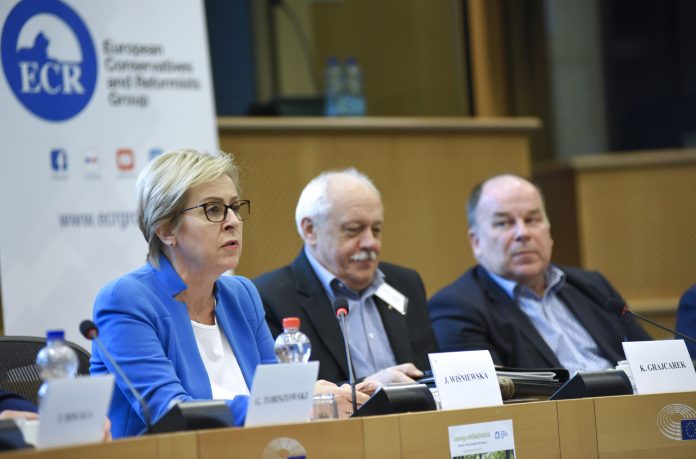Two months before the planned UN Climate Summit in Katowice, the European Parliament hosted the conference: “Social PRE_COP24. The Polish way to a clean environment”, during which Polish postulates regarding the future of climate policy were presented on the international forum. The initiator of the meeting, in which, among others, took part the secretary of state in the Ministry of Energy Grzegorz Tobiszowski, representatives of trade unions, industry organizations and companies associated with the mining and energy industry, was the PiS MEP, Jadwiga Wiśniewska.
“The 24th summit of the UN Climate Convention, which will take place in December in Katowice, is the most important international event during which decisions regarding global climate policy will be made at the highest level”, said Jadwiga Wiśniewska.
Polish politician emphasised that climate policy should not impede the growth of industry, reduce competitiveness or generate excessive costs – both economic and social. It should, however, consider technological development as well as the starting position of individual countries.
“Moreover, it is important that the policy favours environmental objectives based on the concept of climate neutrality, which was included in the Paris Agreement thanks to the efforts of our delegation under the leadership of former Minister of the Environment, Prof. Szyszko”, added Mrs Wiśniewska. As she explained, it entails a balance between greenhouse gas emissions and their absorption by forests and agricultural areas. “This position is beneficial for both: climate goals and the economy”, she said.
According to MEP J. Wiśniewska the agreement signed three years ago in Paris by nearly all the countries in order to reduce emissions was rightly considered as a great success. She said that the effective implementation and monitoring of the provisions of this ‘climate constitution’ are crucial. “Only then will we be able to talk about significant success and progress in global emission reduction.”
She addressed the issue of EU’s idea to decarbonise the economy which aims to achieve a zero-emission economy by 2050. “This postulate does not take into account the economic and social realities of individual member states”, she said.
She explained that this objective would be particularly severe for Poland, for which coal is still playing a key role in the energy mix. “In Poland coal will be the main fuel for the power industry and the guarantor of energy security for many years”, emphasized Mrs Wiśniewska.
The Secretary of State and Government Plenipotentiary for the Restructuring of the Hard Coal Mining Industry Grzegorz Tobiszowski emphasized that it was not enough for the EU to announce its ambitious plans. “They must be feasible”, he said. He added that it should be possible for countries to decide on methods for reducing carbon emissions and usage of natural resources. The government representative stressed that according to Article 194 of the Treaty on the Functioning of the European Union, each state can independently decide on its energy mix. “Poland is making great efforts to fulfil its goals regarding renewable energy sources, is very advanced in terms of energy efficiency and reducing energy intensity, and is undertaking major efforts to implement agreements with the European Union”, underlined Mr Tobiszowski.
Speaking about COP24, Mr Tobiszowski stressed that it would be a crucial summit, which for many decades could set directions for EU climate policy, and its effects may be multi-generational. “I hope that the Katowice conference will also be a breakthrough event, and the negotiating parties will show a mature approach to climate policy”, he concluded.

